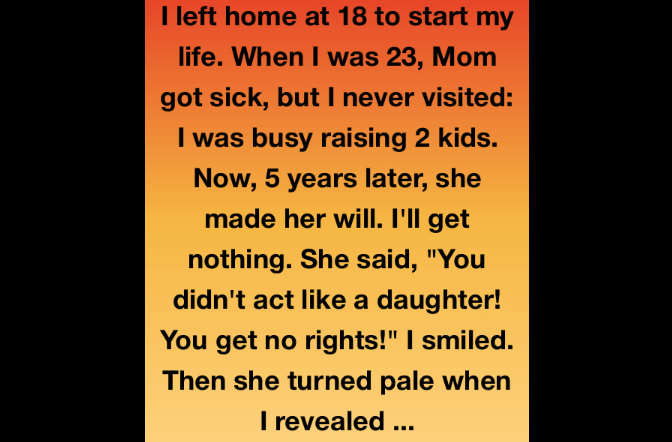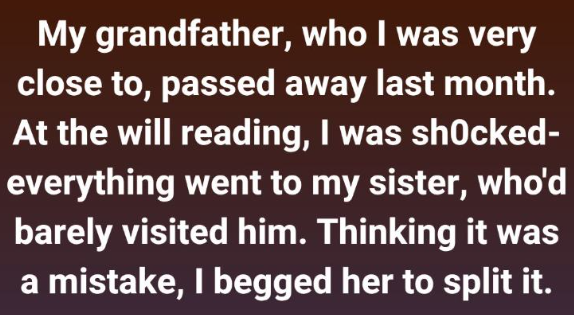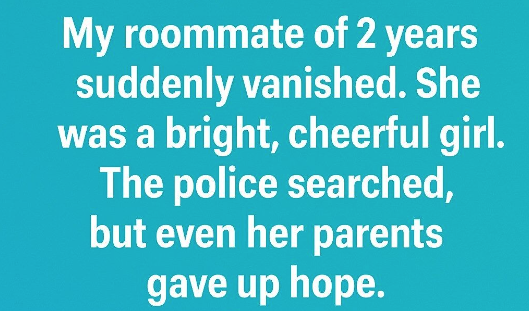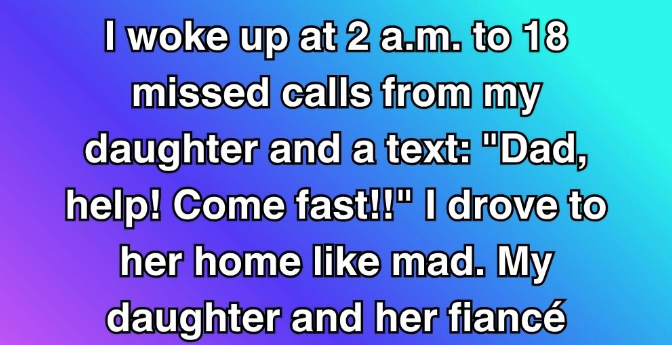At 18, I left home to forge my own path. By 23, Mom fell ill, yet I didn’t visit—I was consumed with raising my two children. Five years on, she drafted her will, leaving me nothing. Her words stung: “You didn’t behave like a daughter! You have no claim!” I smiled softly. Then her face paled as I showed her the letter.
It wasn’t merely a letter—it was a piece of my heart, penned during one of my darkest nights. She never knew it existed. It was a birthday card, scratched onto the back of a grocery receipt, tucked away in a drawer because I couldn’t afford a stamp that week.
Her lips parted when she saw it. Her hands shook.
She noticed the date—April 12th, 2021. Her birthday. The same week my youngest battled pneumonia, and I spent four nights upright in a hospital chair. The week I lost my night job delivering food. The week I sold my phone to buy antibiotics.
The letter was brief. Seven lines.
“Mom, I’m sorry I’m not with you today. Happy birthday. I miss your voice. I’m trying to stay strong, but I feel like I’m crumbling. My hands smell of formula and antiseptic. If I had gas money or a moment to breathe, I’d be there. I love you. Please wait for me.”
Tears welled in her eyes, but I held no anger. I had made peace with our distance long before.
We were never truly close. She was fierce, unyielding, a woman who raised three kids alone after Dad left. She had no patience for fragility, no grasp of it. When I cried as a teen, she’d say, “What does crying solve?”
At 19, when I got pregnant, she declared I was on my own. “If you’re grown enough to have a child, you’re grown enough to raise one.” So I did.
I rented a tiny studio above a laundromat, cleaned houses, and earned my GED. I learned to cook frugally, ration diapers, and calm colic with soft hums. Sleep was a stranger for three years.
Yet my love for her never faded.
I dreamed of returning one day, my kids by my side, to say, “We made it.” I pictured her eyes warming, perhaps her arms opening. But life raced forward, and I could never catch up enough to stop.
I sent brief texts sometimes. “Hope you’re well.” “Saw a cardinal today, thought of you.” Her replies were curt, often silent.
Now, in hospice, her skin was like parchment, her hair gone, her once-fiery voice reduced to frail whispers. She accused me of absence, denying me her ashes, her possessions, her legacy.
“You weren’t there,” she murmured, softer now.
“I was always there,” I replied gently. “In my own way.”
Her gaze flicked to the nurse, who lingered uncomfortably in the corner, pretending not to hear.
“Why show me this now?” Mom asked.
“Because I don’t need anything from you,” I said. “Not money. Not approval. I only wanted you to know I never forgot you.”
That night, I left her room empty-handed—not taking the ring she wore, nor the locket I’d once coveted as a child. I kissed her forehead and whispered, “I forgive you.”
Three days later, she was gone.
A week after the funeral, the lawyer called. “This is unusual,” he said. “She revised her will. You’re the sole beneficiary.”
I blinked. “What?”
“She left a letter,” he added. “Handwritten.”
At his office, he handed me a sealed envelope with my name on it. Only my name.
I opened it carefully.
“Dear Mia, I read your letter a hundred times. You were right—I sought the daughter I envisioned, not the one I had. But now I see you were stronger than I ever was. You didn’t need my validation, but you have it. I’m proud of you. Use what I leave you to rest. You’ve done enough. Love, Mom.”
I wept in the parking lot for hours. Then I called my boys and said we were going home.
But the story didn’t end there.
Entering her house felt like stepping into a time capsule. The same ceramic rooster sat on the table. The same dent marked the sofa cushion. The scent of lavender and lemon Pledge lingered.
In her bedroom drawer, I found a scrapbook I never knew existed. Inside were photos of me and my boys—images I’d sent, even those she never acknowledged. My kids’ drawings. Clippings of events I’d volunteered at. She’d kept it all.
She’d been watching from afar. Silently. Like a shadow.
There was also a folder of letters—letters to me. Unsent. Dozens.
“I wish I knew how to support you, Mia,” one read. “I failed you when you needed me most. I don’t know how to apologize.”
Another: “I saw your son’s photo. He looks like your brother. I cried. I don’t know why I can’t call you.”
She had carried guilt too. Her silence wasn’t coldness—it was shame.
Each letter peeled back another layer of pain I hadn’t realized I held. Knowing she tried, even imperfectly, meant more than any inheritance.
With her money, I didn’t buy a fancy car or a bigger house. I fixed the roof, paid off my student loan. But most of it? I created a small community space for single mothers. Nothing grand—just a place with free diapers, a food pantry, donated clothes, and coffee.
I named it “The Nest.” Mom would’ve scoffed at the softness of the name. But it felt right.
One day, a young woman walked in, baby on her hip, eyes red, voice raw. “I haven’t slept in two nights,” she said. “I don’t know what I’m doing.”
I handed her tea and said, “You’re doing more than enough.”
She cried.
So did I.
We all bear scars. Some are raw and loud. Others are quiet, aching for years. Healing isn’t always a neat resolution. Sometimes it’s a chair, a hug, or the chance to say, “I forgive you,” even if it’s long overdue.
Months after The Nest opened, a letter arrived. No return address.
Inside was a photo—me at 7, holding a handmade birthday card. On the back, Mom’s handwriting: “Mia made this herself. She said it’s for me to keep forever.”
No note. No explanation. But I smiled.
I like to think someone found it in her house, knowing it mattered. Or maybe… maybe she mailed it before she passed, knowing I’d need that final sign.
Now I share stories of their grandmother with my boys. Not only the tough ones, but the quirky ones. How she cooled her cereal with ice cubes because she hated warm milk. How she folded fitted sheets with impossible precision. How she once chased a raccoon from our kitchen with a broom, shouting, “You picked the wrong house!”
They laugh. I laugh too.
The pain lingers at times. Grief is an unpredictable guest—it visits and leaves. But it no longer defines me.
Here’s the unexpected twist: I didn’t get the mother I longed for, but I became the mother I wished I’d had.
That, perhaps, is the true legacy.
If you carry unresolved pain with your parents—if calls go unanswered or words remain unspoken—know that you’re enough. You’re not flawed. You’re human, like all of us.
Healing may begin when we stop waiting for others to change and instead become the person we needed all along.
If this story resonates, share it. Someone out there might need it. ❤️




